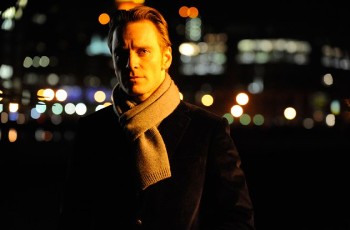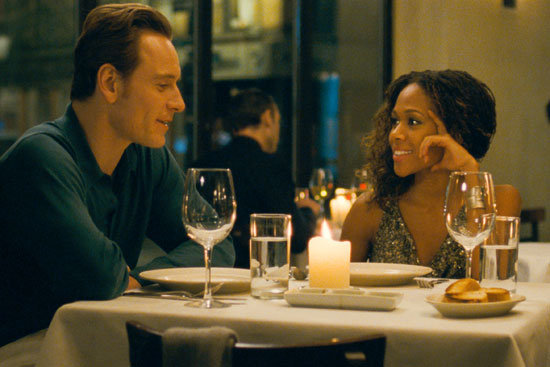Film Review: Of Sex and “Shame”
Director Steve McQueen’s skillful exploration of troubled human behavior and his use of New York as a psychological landscape make “Shame” off-putting to watch, while at the same time it draws us in. We have no moral compass beyond our own attitudes to ambiguous contemporary sexual mores.
Shame, directed by Steve McQueen. Screening in theaters throughout New England.
By Tim Jackson
Both Shame and director Steve McQueen’s previous film, Hunger, involve men who use their bodies in such extreme ways as to become weapons, alienated tools of expression. In Hunger, about the 1981 hunger strike of IRA martyr Bobby Sands, actor Michael Fassbender starved himself in order to intensify a physically brutal performance. In Shame, Fassbender commits his physicality to the character of Brandon, a sex addict who is charming but lives an obsessive, lonely, and detached existence. This nervy and psychologically astute performance, one of the best of the year, requires full frontal nudity and seductions that are not erotic but portraits of a man punishing himself with sex. Brandon’s drive for kicks and stimulation are so compulsive that we gawk and squirm as he spirals downwards.
As in James Cameron Mitchell’s Shortbus and Stanley Kubrick’s Eyes Wide Shut, we are thrown into a world obsessed with anonymous sex where the audience’s judgment of what goes on and its moral value becomes highly subjective. McQueen’s skillful exploration of troubled human behavior and his use of New York as an alienating landscape make Shame off-putting to watch, while at the same time it draws us in. We have no moral compass beyond our own attitudes to ambiguous contemporary sexual mores. As in the Kubrick and Mitchell films, the questions and the answers are necessarily personal.
Brandon’s tidily organized world full of nasty private habits and tawdry secrets is disrupted by the arrival of his sister, Sissy, played by Carey Mulligan with a raw energy that matches Fassbinder’s. Sissy, it seems, has nowhere to live. She temporarily moves in with Brandon, and quickly proceeds to bed his married boss, David, using Brandon’s own apartment for her tryst. The situation of his married boss philandering with his own sister presents an ironic ethical dilemma, given Brandon’s sexual secrets and layers of self-denial. The next day at the office David doesn’t even discuss the affair, but off-handedly mentions that he found a disconcerting amount of X- rated material on Brandon’s work computer and that he might want to think twice about using his work computer for ‘that sort of thing.’ Why is he looking at Brandon’s computer while committing adultery with his sister? Shame doesn’t explore these issues so much as let them fester.
Brandon breaks down, goes home, and destroys his vast collection of pornography. Whether he is capable of shame, of remorse, or even an epiphany becomes one of the film’s central concerns. His addiction may be too ingrained, his sexual dependence and emotional baggage too difficult to check. His apartment is his sanctum, and Sissy’s neediness is one more impediment to his indulging his relentless desire, to on occasion flounder in confusion. She thinks it’s funny to catch him masturbating; for him it is devastating. Their whole relationship is strained, full of troubling incestuous overtones. Each one needs desperately to connect to something, to love, to attach to anything beyond themselves.
McQueen contrasts the grandeur of New York, with its high towers of glass and steel, to the city’s sad, dark corners—small bars and quick pick-ups, a world of fleeting relationships, of low class sex bars and high-class hookers. Brandon begins the film hunkered down in a crowded subway, looking like any nice young man on his way from work, but his eyes prowl, connect, and strike. He is no American Psycho, but a charming and adept predator. McQueen doesn’t dissect the character’s psychological problems. Whatever drives Brandon’s compulsion to seduce, his need for constant stimulation is unexplained. Elemental questions—why Sissy is without a place to live, what she does for work beyond singing, why she feels so alone—are left unresolved. Whatever has led these two siblings to such a desperate point in their lives is unclear. Still, McQueen’s profile of these two becomes a fascinating puzzle that earns our empathy.
Early in the story, in a small bar where Brandon and his boss David (James Badge Dale giving a wonderful portrait of a fatuous man) have gone for drinks, Sissy sings a woozy, bluesy version of “New York, New York” to Brandon.
These vagabond shoes
Are longing to stray
And step around the heart of it
New York, New York.
Neither is finding the heart of New York or anywhere else. At one point, as they wait for a subway, Brandon finds Sissy standing a too little close to the edge of the platform. He pulls her back. ‘What are you doing?’ he asks. ‘Oh, I was going to kill myself,’ she jokes sarcastically. But the pain is real.
Brandon’s own attempt to forge a relationship with Marianne, a stunning black woman from his office, is also more about hurt than connection. Nicole Beharie plays a successful professional, honest and plain spoken. She knows herself, understands the games that are played, knows how they can begin and where they should end. It’s a classy performance made all the more remarkable in that McQueen (who is a black Englishman) not only cast a sophisticated black character as the ‘love’ interest, but disregards race as a concern in the relationship.
The seduction scene is very loving and quite sexy, but Brandon is irredeemable. Knowing that this tryst may well end in disaster becomes painful to watch. Under McQueen’s astute direction, the performances of Fassbender and Mulligan evoke the anguished realities at the heart of sexual hunger.
Tim Jackson was an assistant professor of Digital Film and Video for 20 years. His music career in Boston began in the 1970s and includes some 20 groups, recordings, national and international tours, and contributions to film soundtracks. He studied theater and English as an undergraduate, and has also has worked helter skelter as an actor and member of SAG and AFTRA since the 1980s. He has directed three feature documentaries: Chaos and Order: Making American Theater about the American Repertory Theater; Radical Jesters, which profiles the practices of 11 interventionist artists and agit-prop performance groups; When Things Go Wrong: The Robin Lane Story, and the short film The American Gurner. He is a member of the Boston Society of Film Critics. You can read more of his work on his blog.


